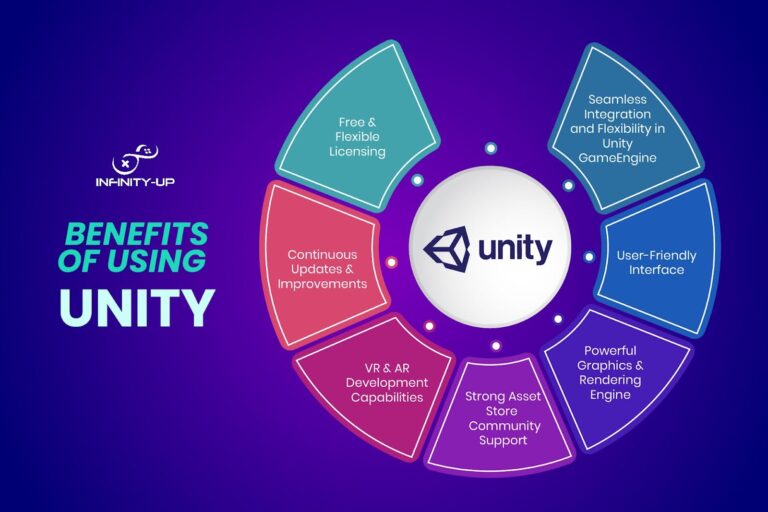Unity: A Complete Guide on How It Works
Unity: A Complete Guide on How It Works
Introduction
Unity is one of the most popular game engines, widely used for developing 2D, 3D, AR, and VR games across multiple platforms. With its user-friendly interface, powerful features, and vast community support, Unity has become the go-to choice for both indie developers and large studios. This guide will take you through how Unity works, its key components, and how to get started.

What is Unity?
Unity is a cross-platform game engine developed by Unity Technologies. It allows developers to create real-time interactive experiences with an extensive suite of tools. Unity supports multiple platforms, including Windows, macOS, Android, iOS, PlayStation, Xbox, and even WebGL.
Unity’s Impact
Unity’s impact reaches far beyond gaming, finding applications in architecture, automotive design, film production, and training simulations. Architects use Unity to craft immersive building walkthroughs, while automotive companies rely on it for virtual prototyping and simulations. Its adaptability makes Unity stand out; no matter the vision, it offers the tools to bring ideas to life.
If you’re looking to take your projects to the next level with top-quality assets, be sure to explore our Blogs. We’ve shared some great recommendations to help you out!
Benefits of Using Unity
The future of Unity looks incredibly promising, as the capabilities of its game engine technology continue to expand. Unity offers numerous advantages for game development, making it a powerful choice for developers. Some of these benefits include:
1. Seamless Integration and Flexibility in Unity Game Engine
The Unity game engine provides exceptional flexibility for developers by allowing seamless integration with various software platforms. Development teams can effortlessly expand upon existing applications and services using Unity, ensuring a smooth and unified experience for both developers and players. This eliminates compatibility concerns across different gaming systems.
2. User-Friendly Interface
Unity has an intuitive and easy-to-use interface that enables beginners and experienced developers to create games efficiently. The drag-and-drop functionality and visual scripting options make it accessible for non-programmers.
3. Powerful Graphics & Rendering Engine
With support for both 2D and 3D development, Unity enhances Video Game Animation with high-quality rendering. Its features, including real-time lighting, shadows, shaders, and post-processing effects, make it an excellent choice for creating visually stunning games.
4. Strong Asset Store & Community Support
Unity’s Asset Store provides thousands of free and paid assets, including models, scripts, animations, and plugins, speeding up development. A large community of developers and extensive documentation also offer valuable resources for troubleshooting and learning.
5. VR & AR Development Capabilities
Unity is a leader in extended reality (XR) development, supporting both virtual reality (VR) and augmented reality (AR) applications that smoothly integrate with various XR platforms, making it a powerful engine for engaging experiences.
6. Continuous Updates & Improvements
Unity Technologies regularly updates the engine with new features, bug fixes, and performance enhancements to keep up with the latest industry standards and hardware advancements.
7. Free & Flexible Licensing
Unity offers a free version for individuals and small businesses, making it accessible for indie developers. Its licensing options scale with business needs, from Unity Pro to Enterprise solutions.

The Growing Opportunities in Unity Game Development
The field of game development continues to expand, presenting numerous growth opportunities. With more developers leveraging a unified platform like Unity, advancements in AI-driven content creation and development are unlocking new possibilities for innovation. Emerging technologies such as VR and AR further enhance Unity’s potential, offering exciting applications for engaging experiences. The Future of Mobile Games with the Unity Engine is shaping groundbreaking gaming experiences, pushing the boundaries of creativity and technology.
The rising popularity of game engines built on Unity’s foundation is creating fresh opportunities for both developers and publishers. As a leading game engine, Unity provides a versatile platform with a comprehensive suite of features, tools, and assets. Its intuitive workflow, combined with an extensive library of resources and tutorials, makes game development more accessible than ever. With Unity, the possibilities for crafting interactive experiences in dynamic virtual worlds are limitless.
Boosting Productivity and Efficiency with Automation
With Unity’s evolving future, automation is rapidly transforming the game development landscape. It has been proven to enhance efficiency and maximize productivity across various industries. By streamlining workflows and optimizing processes, automation allows teams to focus on high-value tasks such as customer engagement and product innovation. Additionally, it minimizes human errors, reduces operational costs, and boosts overall performance. For Game Development Companies, leveraging automation can lead to greater efficiency, scalability, and long-term success in a competitive market.
Greater Use in High-End Enterprise Development
A key indicator of Unity’s future as a game engine is its growing adoption in enterprise and high-end projects. An industry like Disney, NASA, IBM, and Microsoft has leveraged Unity to create custom solutions, demonstrating its capabilities beyond indie development. This widespread use highlights Unity’s ability to deliver professional-grade results, rivaling top-tier game development platforms.
Transforming Gaming with Next-Level Visuals & Graphics
Enhanced graphics and visuals have transformed the way players engage with modern games. Looking ahead, the future of the Unity3D game engine promises even more stunning visual effects and captivating experiences. With cutting-edge advancements, Unity is set to push gaming to new heights, delivering unparalleled realism and interactivity in its upcoming releases.

INFINITY-UP: Unlocking Unity’s Full Potential for Game Development
At INFINITY-UP, we specialize in leveraging Unity’s full potential to develop high-quality, scalable, and engaging gaming experiences. As a leading game development company, we utilize Unity’s robust engine to create hyper-casual, educational, and endless runner games while integrating advanced animation and XR technologies. Our expertise in Unity allows us to craft visually stunning, performance-optimized, and engaging games tailored to various platforms. Whether it’s game design, 2D/3D art, Gamification through Education, or Metaverse solutions, INFINITY-UP is committed to delivering top-tier gaming experiences powered by Unity.
Conclusion
As Unity continues to evolve, its advancements in automation, enterprise adoption, and cutting-edge graphics are shaping the future of game development. With its powerful tools and ever-expanding capabilities, Unity empowers developers to create high-quality, immersive experiences across various industries. As technology progresses, Unity remains at the forefront, driving innovation and setting new standards for the gaming world.
Get a Free Quote Today! Let INFINITY-UP bring your game idea to life with expert Unity development.
FAQ
Q1: What are the main components of the Unity Editor?
A:The main components include:
Scene View: Where you visually design and manipulate your game world.
Game View: Shows the player’s perspective of the game.
Hierarchy Window: Displays all the GameObjects in the current scene.
Project Window: Organizes all the assets (scripts, models, textures, etc.) in your project.
Inspector Window: Shows the properties of the selected GameObject or asset.
Console Window: Displays error messages, warnings, and debug information.
Q2: Do I need coding skills to use Unity?
A: While Unity supports a visual scripting tool, coding (mainly in C# (C Sharp) is essential for advanced functionality and custom game mechanics.
Q3: What is the Unity Asset Store?
A: A marketplace for assets like 3D models, scripts, textures, and plugins. Integrates directly into the Editor, enabling drag-and-drop functionality to speed up development.
Q4: How does Unity handle user input?
A: Unity’s Input Manager allows you to define and map input devices (keyboard, mouse, gamepad) to actions. You can then access these actions in your scripts.

